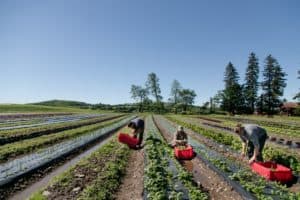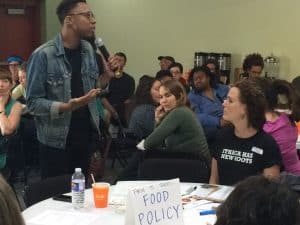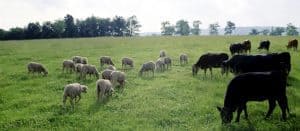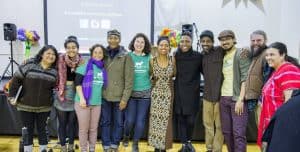Farming and Food Abundance in the Finger Lakes
Loosely defined, farming is “the activity or business of growing crops and raising livestock.” Food is the consumable form of these crops and/or livestock, which creates energy within our body. In today’s society, there are so many different forms of food, some of which are so highly processed that it’s easy to forget it is derived from a whole, living source of energy, and that farming and food are essential to our survival as human beings. Groundswell Center is located in a fertile valley of the Finger Lakes on land inhabited by and stolen from the Haudenosaunee Confederacy, south of and surrounding Cayuga Lake.
The Finger Lakes region is abundant with a diversity of farming methods,  enterprises and products. Historically, the agriculture of this region was steep in peach and apple orchards, maple sugar bushes, and grain. Today the region is rich with small sustainable farmers producing pastured meats, organic produce, yogurt, organic grain, hops and beer, apples and cider, maple syrup and more. However, farmland loss to big ag (such as confined dairy operations) and development pressures puts the small-scale farmer and producer at risk.
enterprises and products. Historically, the agriculture of this region was steep in peach and apple orchards, maple sugar bushes, and grain. Today the region is rich with small sustainable farmers producing pastured meats, organic produce, yogurt, organic grain, hops and beer, apples and cider, maple syrup and more. However, farmland loss to big ag (such as confined dairy operations) and development pressures puts the small-scale farmer and producer at risk.
Groundswell Center plays a significant role for Finger Lakes farmers to not only develop and run viable businesses but also to support beginning farmers to consider and center values of equity in their businesses. We try to bridge the social, economical and racial gaps in the local food and farming economy.
Equity and Justice
Social injustice is rampant in our food system. People of color and those with limited resources disproportionately face the detrimental impacts of land theft, lack of access to land, food apartheid neighborhoods, diet-related health problems, and food- and farm-worker exploitation. These issues have their roots in the founding of the United States and its history of genocide and land theft from indigenous peoples, exploitation of enslaved black and brown people, accumulation of wealth and land ownership through policies that excluded (and some that continue to discriminate against) black people from land and home ownership, and immigration policies that have controlled borders and people.
 However, there are many incredible organizations, groups of people and individuals who have worked throughout history to achieve food justice and food sovereignty, or “right of peoples to healthy and culturally appropriate food produced through ecologically sound and sustainable methods, and their right to define their own food and agriculture systems.” (Declaration of Nyéléni)
However, there are many incredible organizations, groups of people and individuals who have worked throughout history to achieve food justice and food sovereignty, or “right of peoples to healthy and culturally appropriate food produced through ecologically sound and sustainable methods, and their right to define their own food and agriculture systems.” (Declaration of Nyéléni)
Groundswell Center tries to use language to discuss and help educate about equity and justice in all of our educational materials and workshops. We've developed a collection of resources about food justice related issues, as well as community based ways to address them. Actively, as an organization, Groundswell Center has committed to the goals outlined in our Equity Statement, including promoting equity and justice through our system of governance through multiple committee and governing practices that are transitioning us towards a less hierarchical structure; providing land access through our Incubator Farm Program, which currently is farmed by mostly Karen refugees from Burma; redistributing 10% of the money we raise annually from private donations to organizations led by people of color; instituting a sliding scale and solidarity pricing structure for all our services and programs; and ensuring the voices of people of color are prominent as instructors and speakers in our programs and events.
You can learn more about justice and equity within the food and farming industry through our monthly Farming for Justice discussion group, or consider joining our Equity & Accountability Committee.
Regenerative Agriculture
For nearly a century, industrial agriculture has dominated the food system in the US, whereby a small number of large corporations control much of the food available to consumers, which is grown through farming practices that deplete the soil, waste natural resources, pollute water and air, kill wildlife, insects and other species, and accelerate climate change. By definition, regenerative agriculture is a system of farming principles and practices that increase biodiversity, enrich the soil, improve watersheds, and enhance ecosystems and their services.
Groundswell Center’s educational workshops, events, consultations and Incubator  Farm Program promote growing methods derived from regenerative agriculture practices. We teach about building soil health, minimizing water use and preparing for droughts, uphold animal welfare, reduce fossil fuel inputs, and have an eye toward regenerating the land we are a part of and grow on rather than depleting it. We also acknowledge that prior to colonization, these lands were tended to and cared for by Indigenous peoples, and those stolen from their homelands as slaves. We acknowledge that their ancient sciences practiced regenerative agriculture before these terms existed, and we seek to support and encourage the support of our local Indigenous and Black communities and their earth-based practices, while never exploiting them. We also acknowledge and honor the systems of regenerative agriculture that exist amongst these communities globally, and those that came to this continent with our African relatives. Some of the many examples of practices foundational to regenerative agriculture that were founded by black or Indigenous people are: three sisters companion planting, community supported agriculture (CSA), permaculture, biodynamic farming, and composting.
Farm Program promote growing methods derived from regenerative agriculture practices. We teach about building soil health, minimizing water use and preparing for droughts, uphold animal welfare, reduce fossil fuel inputs, and have an eye toward regenerating the land we are a part of and grow on rather than depleting it. We also acknowledge that prior to colonization, these lands were tended to and cared for by Indigenous peoples, and those stolen from their homelands as slaves. We acknowledge that their ancient sciences practiced regenerative agriculture before these terms existed, and we seek to support and encourage the support of our local Indigenous and Black communities and their earth-based practices, while never exploiting them. We also acknowledge and honor the systems of regenerative agriculture that exist amongst these communities globally, and those that came to this continent with our African relatives. Some of the many examples of practices foundational to regenerative agriculture that were founded by black or Indigenous people are: three sisters companion planting, community supported agriculture (CSA), permaculture, biodynamic farming, and composting.
Relationship Building
At the foundation of farming, food, regenerative agriculture, equity and justice is building relationships that are cultivated and necessary in the work we do. A farmer in our community once wisely stated that relationships only move at the speed of trust, and we at Groundswell Center accept that as true. In order to promote our Core Values and educate, we must build strong relationships within the community, acknowledging that the food system affects us all, and everybody has a right to chemical-free, locally grown, minimally processed, and non-gmo food to thrive, not just survive. To ensure that our programs and resources are making the largest impact possible, we strive to create lasting relationships with the members in the local community. While we offer workshops and dozens of learning opportunities throughout the year, much of our work and progress is slow, and overtime, just as generating healthy soil takes time, so does building trust.
 Another example is our Land Access work. We’ve been involved in a new initiative alongside many other organizations and local community members called the Land Access, Reconciliation, and Reparations Working Group. This group collaboratively organizes events and takes action to rematriate Gayogohono lands, help connect land to land stewards, and facilitate conversations on what reparations and reconciliation can look like in our community.
Another example is our Land Access work. We’ve been involved in a new initiative alongside many other organizations and local community members called the Land Access, Reconciliation, and Reparations Working Group. This group collaboratively organizes events and takes action to rematriate Gayogohono lands, help connect land to land stewards, and facilitate conversations on what reparations and reconciliation can look like in our community.
As a local food & farming organization centered in equity, what we do wouldn’t have impact without community support and accountability with indigenous, POC, refugee and immigrant communities. Through outreach, collaboration and support, we value all of the ways in which we can be a supportive and useful resource for the community, while bettering our work through our understanding of the current climate of our local food and farming economy. Our Partners are essential to our make-up as an organization; our collaborations with regional institutions, local organizations and individuals shapes our efforts and identity, and we often seek funding and propose new initiatives with these partners.
At Groundswell Center we are rooted in our local communities, and trust that local relationships between farmers, eaters and land are important for transparency, respect and community wellbeing. We also believe that our food system cannot be truly sustainable without racial and economic justice and equitable access to healthy food, land for growing it, and dignified, fairly-compensated food system jobs.
